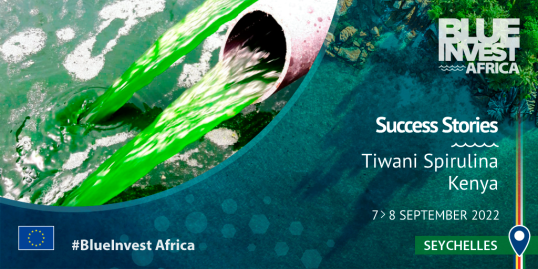Tiwani Spirulina started growing spirulina in 2014. Since then, the Kenyan company’s cultivation ponds are spread over one hectare, between the palm trees of Tiwi Kwale, 25 km south of Mombasa. The climate and the quality of the environment are ideal. Another advantage of this place is that southern Kenya is home to a renowned strain of spirulina.
“We chose the Arthrospira platensis strain from Lake Natron, because it was a localised strain and quite close to our intended growing location,” explains Luke Harries, managing director of Tiwani Spirulina. ”It was also the strain that we found at UTEX, the University of Texas algae laboratory.”
Although it grows in water, spirulina is not an algae. It is a cyanobacterium that lives mainly in tropical lakes. Dried and ground, it’s a traditional food in several American and African cultures that had guessed its richness in proteins (up to 70%), vitamins, minerals, and trace elements. It was in Chad, in the form of flat biscuits, that the West discovered spirulina in the 1970s and elevated it to the rank of "superfood".
Consolidating the local market
Tiwani’s objective was to invest in a market niche still unexplored in Africa, with the desire to promote a product with multiple outlets: food supplements for humans and animals, cosmetics, biofuels, etc. In 2019, the Kenyan authorities decided to pay more attention to the sector by establishing a production standard for the manufacture of spirulina powder. Because Tiwani Spirulina does not limit its activity to cultivation. A quick visit to the company's e-shop reveals attractive packaging of spirulina in capsule or powder form.
Luke Harries: “We go through the entire process at our farm from production: drying, processing and packing to branding and selling directly to businesses and customers. At the moment, we are focused on Africa. 95% of our business is in Kenya, but volumes are small because people are still learning about spirulina: what it is, the benefits it offers and how it is grown. We expect the Kenyan market to grow alongside the rising middle class, which is very interested in natural superfoods and health, but now, our products are targeting more affluent individuals who can afford it. We are aiming at 25,000 repeat customers (0.5% of the population of Nairobi) buying 40 g of spirulina per month, which would equate to 1 tonne of spirulina per month.”
A regional niche
At this stage, Tiwani is not targeting Europe or North America. These markets are largely dominated by Asian and American producers. These markets are largely dominated by Asian and American producers. Their prices cannot be competed with by an African entrepreneur who faces other cost constraints.
“The price of imported refined fertilisers and the certification costs are high, and the production volumes required are too large for us,” says Luke Harries. “Therefore we are focussing on the local market initially. We are also interested in the regional market: East Africa (Uganda and Tanzania), as well as Southern Africa (South Africa, Zambia) and the Middle East.”
The dream of a spirulina hub
Tiwani Spirulina hopes to raise awareness of the importance of superfoods in the fight against malnutrition and to strengthen public health, if necessary, with the support of public authorities.
“Once the market and demand for spirulina grows, we would like to train and encourage outgrowers to participate more so when we move a portion of our business into cosmetics and nutraceuticals,” explains Luke Harries. “There is a lot of good climate areas in Kenya for spirulina production, which do not favour other types of agriculture. We hope that in time, whether through our farm or through another operation, an EPZ for spirulina will be created in the export arena and that one day, Kenya will be known as a spirulina export nation alongside tea, flowers and vegetables.”
More information: www.tiwanispirulina.com

